牛津译林版英语八年级上册同步课件Unit 5 Period 4 Grammar(23张)
文档属性
| 名称 | 牛津译林版英语八年级上册同步课件Unit 5 Period 4 Grammar(23张) |

|
|
| 格式 | pptx | ||
| 文件大小 | 928.0KB | ||
| 资源类型 | 教案 | ||
| 版本资源 | 牛津译林版 | ||
| 科目 | 英语 | ||
| 更新时间 | 2022-06-06 00:00:00 | ||
图片预览

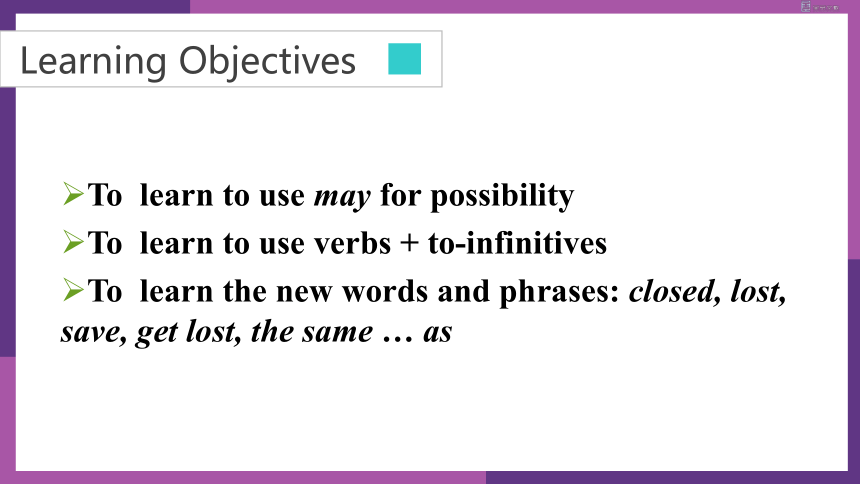
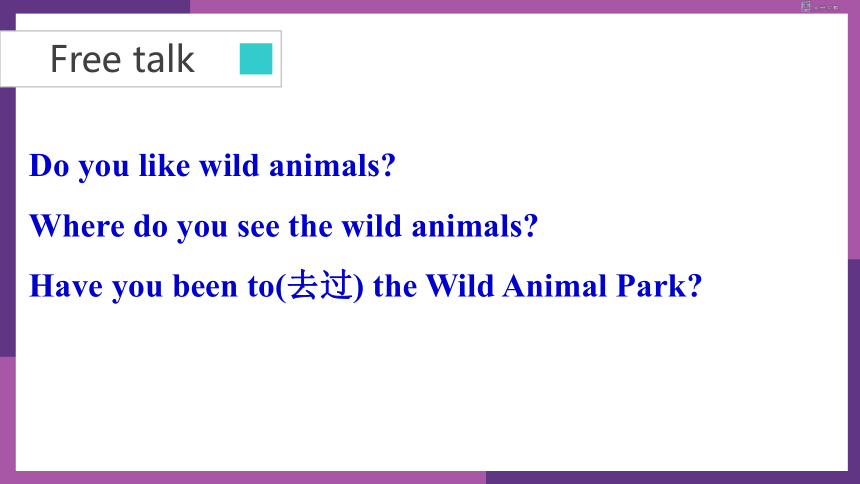
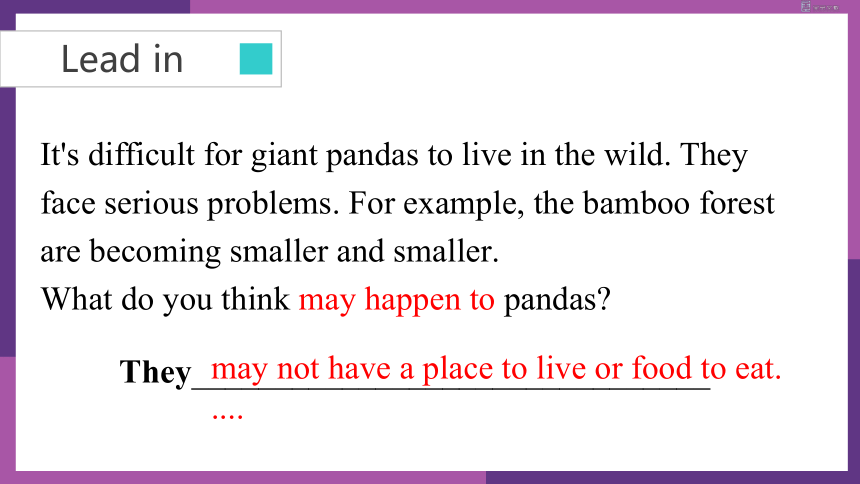
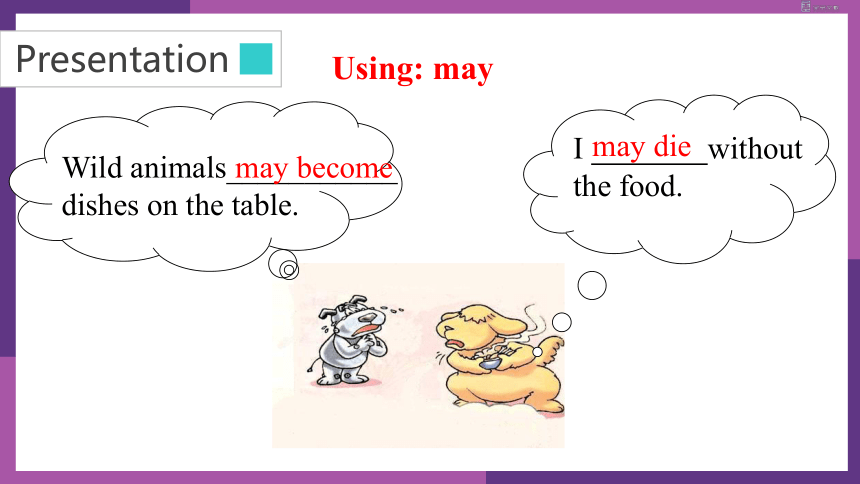
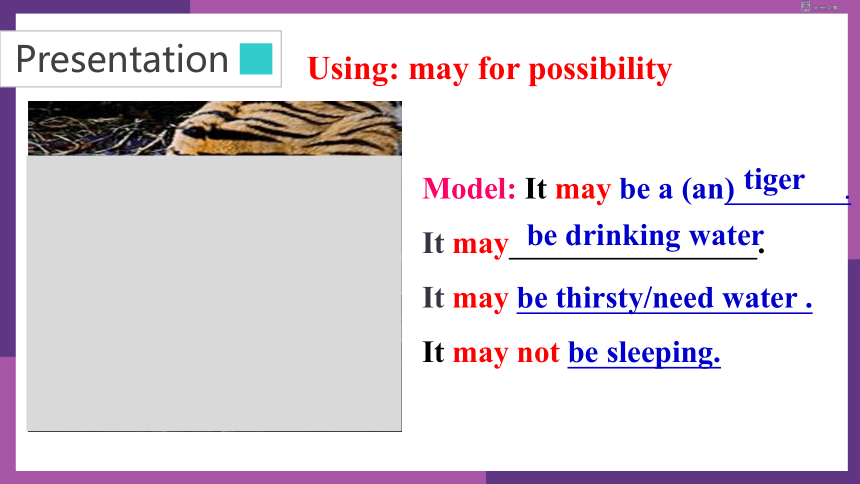
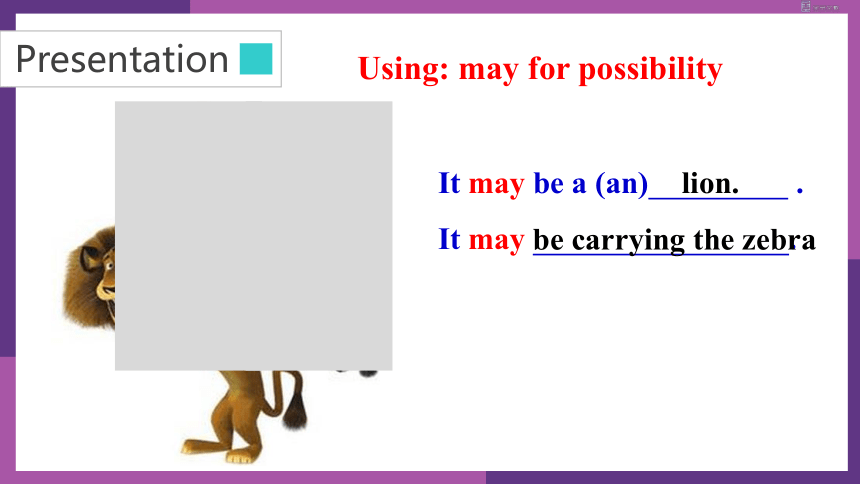
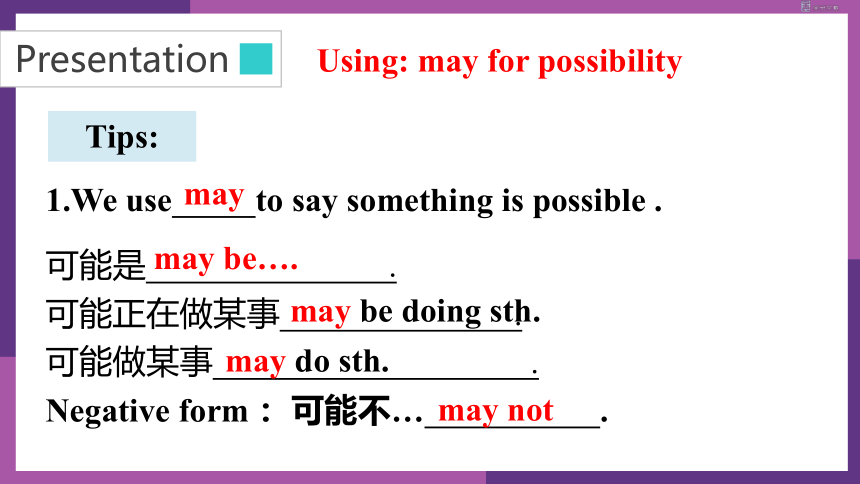
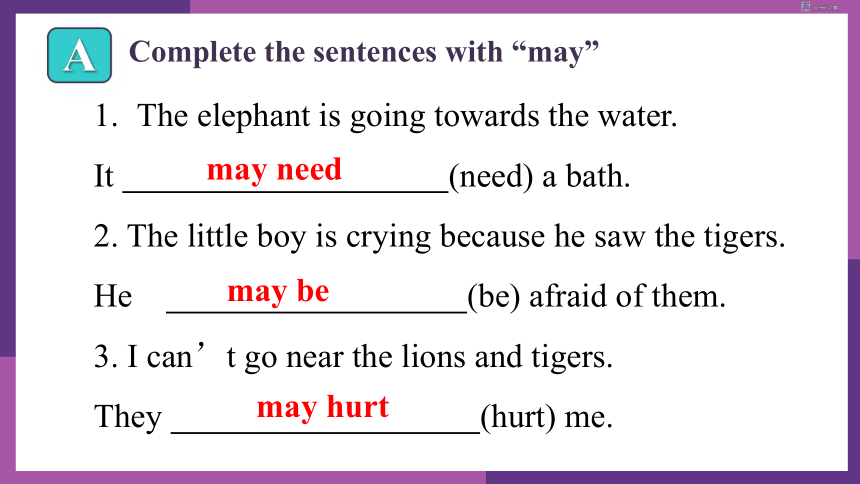
文档简介
(共23张PPT)
Unit 5 Wild animals
Grammar
To learn to use may for possibility
To learn to use verbs + to-infinitives
To learn the new words and phrases: closed, lost, save, get lost, the same … as
Learning Objectives
Free talk
Do you like wild animals
Where do you see the wild animals
Have you been to(去过) the Wild Animal Park
Lead in
It's difficult for giant pandas to live in the wild. They face serious problems. For example, the bamboo forest are becoming smaller and smaller.
What do you think may happen to pandas
They_______________________________
may not have a place to live or food to eat.
....
Presentation
I without the food.
Wild animals___________ dishes on the table.
may become
may die
Using: may
Presentation
Using: may for possibility
Model: It may be a (an) .
It may .
be drinking water
It may be thirsty/need water .
It may not be sleeping.
tiger
Presentation
Using: may for possibility
It may be a (an) .
It may .
lion.
be carrying the zebra
Presentation
Using: may for possibility
Tips:
1.We use to say something is possible .
may
可能是 .
可能正在做某事 .
可能做某事 .
Negative form :可能不… .
may not
may be….
may be doing sth.
may do sth.
A
The elephant is going towards the water.
It (need) a bath.
2. The little boy is crying because he saw the tigers.
He (be) afraid of them.
3. I can’t go near the lions and tigers.
They (hurt) me.
may need
may be
may hurt
Complete the sentences with “may”
4. The baby panda is not drinking its mum's milk.
It (not be) hungry.
5. The monkeys are jumping around.
They (be playing) with each other.
6. The horse is standing with its eyes closed.
It (be sleeping) .
may not be
may be playing
may be sleeping
Extension
May表示“可能”时,相当于perhaps, maybe
1. He may not be at home now.
=Perhaps he isn't at home now.
=Maybe he isn't at home now.
2. The baby may have something nice to eat.
=Perhaps the baby has something nice to eat.
=Maybe the baby has something nice to eat.
Fill in the blanks
2.We should take a map. We may .
1.We should take an umbrella. It may .
3.We should take some food and drinks.
We may .
rain /...
get lost /...
feel hungry and thirsty/…
4.Don't feed the animals bad food. They may_____________
feel ill / ...
5.Don't shout at the animals. They may
.
feel afraid/ be afraid/....
Presentation
Grammar B: Using verbs+to-infinitives
1. Li Hua wants to play in the next World Cup.
2. I plan to eat more fruit and vegetables every day.
3. After dinner, we like to watch TV and chat there.
Presentation
Grammar B: Using verbs+to-infinitives
Sentences from this unit:
1. At four months old, she weighed about eight kilograms and started to go outside for the first time.
2. When she was six months old, she began to eat bamboo.
3. When she was 20 months old, she learnt to look after herself.
Presentation
Grammar B: Using verbs+to-infinitives
上面例子中主要行为动词后面的动词都采用了“to + 动词原形”的结构,我们把这种结构称为动词不定式(有时可以不带to)。当句子中已经有谓语动词,而我们又要表达不止一个动作概念时,其余的动词可以使用非谓语形式表达。动词不定式就是动词的一种非谓语形式,其基本形式是“to+动词原形”,否定形式为 “not to+动词原形”。
Complete the conversation
B
Dad: Do you know anything special about wild animals
Amy:Yes,Dad.For example, Dolphins are clever. They can
_______________(learn, work out) easy maths problems.
Dad: What do you know about bats
Amy: Bats can't see, but they can __________(decide,fly)
the right way with the help of their mouth and ears.
Dad: Did you know that bees never get lost
Amy: Yes. Bees always___________________(remember, come back) the same way as they went.
learn to work out
decide to fly
remember to come back
Dad: What do you know about squirrels
Amy: They always_____________(begin, save) some food before winter comes.
Dad: Yes, but sometimes they forget where to find the food.
begin to save
Extension
不定式放在及物动词后,用作宾语
常用动词不定式作宾语的动词有:
want, plan, hope, learn, decide,would like, begin,
start, try, need, forget, choose, agree, promise
有些动词既可跟不定式作宾语,也可跟动名词作宾语,
但含义不同:
forget to do sth. 忘记要做某事
forget doing sth. 忘记曾经做过某事
stop to do sth. 停下来去做某事
stop doing sth. 停止做某事
go on to do sth. 继续做另一件事
go on doing sth. 继续做原来在做的事
need to do sth. 需要做某事
need doing sth. 需要被做
Fill in the blanks
1. — Don’t forget ______ your homework, John.
— OK, I’ll do it right now.
2. — Have you decided which senior high school to choose
— Not yet. I ______ go to Moonlight School.
3. — Excuse me, when are we going to have a picnic
— I’m not sure, Ask our monitor, please.
He ______ know.
to do
may
may
4. Drivers shouldn’t be allowed ________ after drinking, or they will break the law.
5. —Bob, where is Linda
—She _______ be in the library, but I am not sure.
to drive
may
根据提示完成句子。
1. 这个小老虎可能有点怕游客。
The baby tiger ______________________ tourists.
2. 我刚才放那个风筝失败了。你想不想放放试试?
I _________ the kite just now. Would you like __________ it
3. 在我爸爸的帮助下,我学会了做纸飞机。
___________________, I _____________ paper planes.
4. 没有地图,你可能会迷路的。
You ________________________ without a map.
may be a little afraid of
failed to fly
to try to fly
With my father’s help
learnt to make
may get lost / lose your way
GOOD JOB
Unit 5 Wild animals
Grammar
To learn to use may for possibility
To learn to use verbs + to-infinitives
To learn the new words and phrases: closed, lost, save, get lost, the same … as
Learning Objectives
Free talk
Do you like wild animals
Where do you see the wild animals
Have you been to(去过) the Wild Animal Park
Lead in
It's difficult for giant pandas to live in the wild. They face serious problems. For example, the bamboo forest are becoming smaller and smaller.
What do you think may happen to pandas
They_______________________________
may not have a place to live or food to eat.
....
Presentation
I without the food.
Wild animals___________ dishes on the table.
may become
may die
Using: may
Presentation
Using: may for possibility
Model: It may be a (an) .
It may .
be drinking water
It may be thirsty/need water .
It may not be sleeping.
tiger
Presentation
Using: may for possibility
It may be a (an) .
It may .
lion.
be carrying the zebra
Presentation
Using: may for possibility
Tips:
1.We use to say something is possible .
may
可能是 .
可能正在做某事 .
可能做某事 .
Negative form :可能不… .
may not
may be….
may be doing sth.
may do sth.
A
The elephant is going towards the water.
It (need) a bath.
2. The little boy is crying because he saw the tigers.
He (be) afraid of them.
3. I can’t go near the lions and tigers.
They (hurt) me.
may need
may be
may hurt
Complete the sentences with “may”
4. The baby panda is not drinking its mum's milk.
It (not be) hungry.
5. The monkeys are jumping around.
They (be playing) with each other.
6. The horse is standing with its eyes closed.
It (be sleeping) .
may not be
may be playing
may be sleeping
Extension
May表示“可能”时,相当于perhaps, maybe
1. He may not be at home now.
=Perhaps he isn't at home now.
=Maybe he isn't at home now.
2. The baby may have something nice to eat.
=Perhaps the baby has something nice to eat.
=Maybe the baby has something nice to eat.
Fill in the blanks
2.We should take a map. We may .
1.We should take an umbrella. It may .
3.We should take some food and drinks.
We may .
rain /...
get lost /...
feel hungry and thirsty/…
4.Don't feed the animals bad food. They may_____________
feel ill / ...
5.Don't shout at the animals. They may
.
feel afraid/ be afraid/....
Presentation
Grammar B: Using verbs+to-infinitives
1. Li Hua wants to play in the next World Cup.
2. I plan to eat more fruit and vegetables every day.
3. After dinner, we like to watch TV and chat there.
Presentation
Grammar B: Using verbs+to-infinitives
Sentences from this unit:
1. At four months old, she weighed about eight kilograms and started to go outside for the first time.
2. When she was six months old, she began to eat bamboo.
3. When she was 20 months old, she learnt to look after herself.
Presentation
Grammar B: Using verbs+to-infinitives
上面例子中主要行为动词后面的动词都采用了“to + 动词原形”的结构,我们把这种结构称为动词不定式(有时可以不带to)。当句子中已经有谓语动词,而我们又要表达不止一个动作概念时,其余的动词可以使用非谓语形式表达。动词不定式就是动词的一种非谓语形式,其基本形式是“to+动词原形”,否定形式为 “not to+动词原形”。
Complete the conversation
B
Dad: Do you know anything special about wild animals
Amy:Yes,Dad.For example, Dolphins are clever. They can
_______________(learn, work out) easy maths problems.
Dad: What do you know about bats
Amy: Bats can't see, but they can __________(decide,fly)
the right way with the help of their mouth and ears.
Dad: Did you know that bees never get lost
Amy: Yes. Bees always___________________(remember, come back) the same way as they went.
learn to work out
decide to fly
remember to come back
Dad: What do you know about squirrels
Amy: They always_____________(begin, save) some food before winter comes.
Dad: Yes, but sometimes they forget where to find the food.
begin to save
Extension
不定式放在及物动词后,用作宾语
常用动词不定式作宾语的动词有:
want, plan, hope, learn, decide,would like, begin,
start, try, need, forget, choose, agree, promise
有些动词既可跟不定式作宾语,也可跟动名词作宾语,
但含义不同:
forget to do sth. 忘记要做某事
forget doing sth. 忘记曾经做过某事
stop to do sth. 停下来去做某事
stop doing sth. 停止做某事
go on to do sth. 继续做另一件事
go on doing sth. 继续做原来在做的事
need to do sth. 需要做某事
need doing sth. 需要被做
Fill in the blanks
1. — Don’t forget ______ your homework, John.
— OK, I’ll do it right now.
2. — Have you decided which senior high school to choose
— Not yet. I ______ go to Moonlight School.
3. — Excuse me, when are we going to have a picnic
— I’m not sure, Ask our monitor, please.
He ______ know.
to do
may
may
4. Drivers shouldn’t be allowed ________ after drinking, or they will break the law.
5. —Bob, where is Linda
—She _______ be in the library, but I am not sure.
to drive
may
根据提示完成句子。
1. 这个小老虎可能有点怕游客。
The baby tiger ______________________ tourists.
2. 我刚才放那个风筝失败了。你想不想放放试试?
I _________ the kite just now. Would you like __________ it
3. 在我爸爸的帮助下,我学会了做纸飞机。
___________________, I _____________ paper planes.
4. 没有地图,你可能会迷路的。
You ________________________ without a map.
may be a little afraid of
failed to fly
to try to fly
With my father’s help
learnt to make
may get lost / lose your way
GOOD JOB
